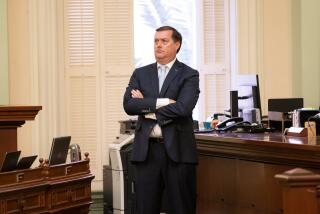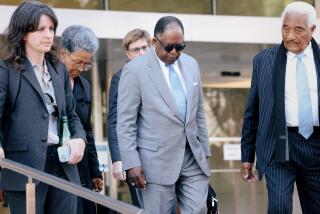Witnesses Called in Bid to Avoid Baugh Trial
- Share via
In an attempt to short-circuit a full-scale trial, Assemblyman Scott Baugh’s attorneys began presenting witnesses Monday at his preliminary hearing before Municipal Judge William Evans.
Baugh’s attorneys said the unusual defense move--most defendants do not present witnesses at a preliminary hearing--was aimed at laying the groundwork for a dismissal of the felony charges Baugh faces in connection with his first campaign for office in 1995.
Baugh (R-Huntington Beach) is charged with five felony perjury counts and 13 misdemeanor violations of the Campaign Reform Act for allegedly falsifying campaign spending and financial disclosure forms during the crucial campaign to recall and replace Assemblywoman Doris Allen.
Baugh’s attorneys argued that the testimony offered by their witnesses would show that criminal prosecution is unwarranted for the alleged campaign violations.
Ravi Mehta, a former chairman of the Fair Political Practices Commission, testified that few candidates are prosecuted for perjury under election laws and that most violations are handled by the commission in an administrative procedure and not as criminal violations.
Mehta resigned from the commission after provoking a public outcry by publicly attacking Proposition 208, the campaign finance reform initiative he was sworn to uphold.
On cross-examination, Mehta testified that the commission lacked authority until January to even prosecute perjury cases and that the commission considers, in deciding whether to prosecute a case, whether the violations affected the outcome of the election.
Baugh’s lawyers want Evans to dismiss the charges and send them to the commission for administrative prosecution.
Prosecutors, however, contend that the case goes beyond the narrow focus of most Fair Political Practices Commission violations, and it amounts to a willful effort by Baugh to hide critical information from voters during that election.
At the heart of the case are allegations that Baugh falsified his campaign spending reports to conceal a $1,000 contribution from his friend Laurie Campbell, who was recruited by Republicans to run as a Democrat to split the Democratic vote and ensure Baugh’s victory.
More to Read
Get the L.A. Times Politics newsletter
Deeply reported insights into legislation, politics and policy from Sacramento, Washington and beyond. In your inbox twice per week.
You may occasionally receive promotional content from the Los Angeles Times.









